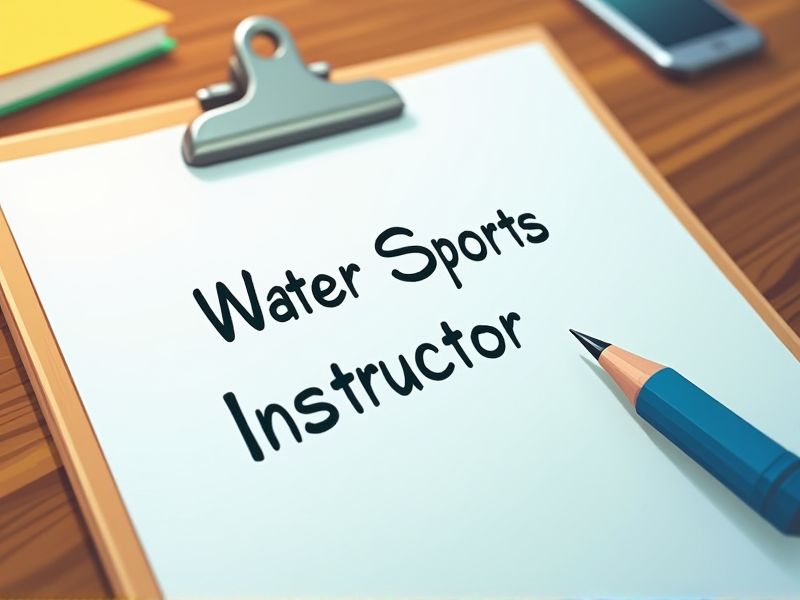
Water sports instructors require specific certifications to ensure they possess the necessary skills to provide safe and effective training. These certifications confirm an understanding of safety protocols, equipment handling, and emergency response procedures. Holding the right credentials also establishes credibility and professionalism in the industry. Essential certifications for a water sports instructor include the following.
American Red Cross Water Safety Instructor Certification
Having the American Red Cross Water Safety Instructor Certification establishes a standardized level of competence in water safety skills. It ensures instructors have comprehensive knowledge of teaching swimming and water safety, reducing accident risks. This certification enhances credibility, often required by employers in aquatic facilities or water sports programs. Earning it can lead to better job opportunities and increased trust from clients.
American Red Cross Lifeguard Certification
Obtaining the American Red Cross Lifeguard Certification equips a water sports instructor with essential lifesaving skills, ensuring immediate response to emergencies, which increases participant safety. The certification provides comprehensive training in CPR and first aid, which are crucial during water-based activities. Employers in the water sports industry often require this certification as a standard qualification, enhancing job prospects. Certified lifeguards are better prepared to identify potential water dangers, fostering a safer environment for all participants.
CPR/AED Certification
Water sports instructors often supervise activities in environments where drowning risks are high, making CPR/AED certification critical for immediate response. The presence of an AED can significantly increase survival rates in cases of sudden cardiac arrest, a potential risk during physically demanding water sports. Certification in CPR ensures instructors are prepared to promptly provide life-saving techniques before professional medical help arrives. Water sports instructors with CPR/AED expertise can increase the safety and confidence for both participants and stakeholders in aquatic settings.
First Aid Certification
Water sports instructors regularly encounter environments where injuries can occur, such as drowning or equipment accidents, making first aid certification essential. With proper first aid training, an instructor can respond effectively to emergencies, increasing the odds of positive outcomes. Many legal regulations and water sports organizations mandate such certification to ensure participant safety and reduce liability risks. First aid knowledge empowers instructors to stabilize situations until professional medical help arrives, enhancing overall trust and safety in their instruction.
American Water Ski Instructors Association Certification
Obtaining the American Water Ski Instructors Association Certification ensures an instructor has met recognized safety and teaching standards. Certified instructors are more likely to gain trust from clients and employers, as the credential signifies expertise. These qualifications reduce the risk of accidents and liabilities by promoting best practices. The certification fosters uniformity in teaching methods, enhancing the overall learning experience for students.
PADI Open Water Diver Certification
To instruct water sports safely, instructors need a solid base in diving techniques, which the PADI Open Water Diver Certification provides. This certification ensures potential instructors have mastered necessary safety protocols crucial to preventing underwater accidents. Obtaining the certification demonstrates a commitment to professionalism, which is a key factor in building trust with clients. Diving skills acquired through PADI training increase an instructor's competence, enhancing the overall experience for participants.
Stand Up Paddleboard Instructor Certification
Acquiring a Stand Up Paddleboard Instructor Certification ensures that a water sports instructor possesses essential skills and knowledge for safely guiding participants. Certified instructors are better equipped to teach proper techniques, significantly reducing the risk of accidents. This certification elevates an instructor's credibility, attracting more clients and boosting their professional reputation. Employers prefer certified instructors due to their proven expertise, enhancing perceived reliability and competence.
Kayak Instructor Certification
Certification provides a standard of safety, ensuring instructors know how to manage and respond to emergencies in water environments. Training enhances skills, enabling instructors to effectively teach and guide participants in kayaking techniques. Certification often leads to increased job opportunities, as employers prefer hiring knowledgeable and credentialed instructors. Quality assurance is elevated, as certified instructors maintain consistent and reliable instruction standards, promoting a better experience for participants.
Wakeboard Instructor Certification
Obtaining Wakeboard Instructor Certification equips instructors with essential skills to ensure the safety of participants, minimizing the risk of accidents. Certification provides standardized methods and teaching techniques that enhance the educational experience, ensuring students receive high-quality training. Certified instructors add credibility to water sports programs, attracting more students and boosting business for water sports facilities. Regulatory bodies often require certification to meet legal compliance, protecting instructors and facilities from potential liabilities.
Rescue Watercraft Operator Certification
Water Sports Instructors often operate in dynamic environments, and obtaining a Rescue Watercraft Operator Certification equips them with crucial emergency response skills. The certification ensures instructors can safely navigate watercraft, minimizing risks to participants and themselves. Proficiency in rescue techniques enhances the instructor's ability to react effectively in emergencies, potentially saving lives. This certification also builds trust with clients, as it demonstrates a commitment to safety and professional standards.
Summary
As a reader exploring career paths, understanding the benefits of certifications for a Water Sports Instructor can be crucial. Certifications often enhance instructors' skills, leading to improved teaching techniques and increased safety for participants. Students are likely to experience elevated confidence and satisfaction due to the instructor's recognized proficiency. Consequently, career opportunities for certified instructors expand, as certifications bolster reputation and demand within the industry.
